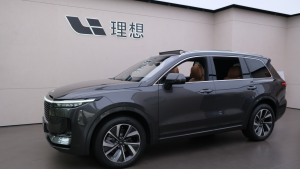Amidst the swirling currents of the stock market, electric vehicle (EV) stocks are riding a wave of optimism as global projections reach dizzying heights. By 2030, the EV market is anticipated to soar to $951.9 billion, more than doubling from $388.1 billion. This burgeoning industry is capturing the imagination of investors across the globe.
China’s Electric Revolution
Driving this surge is China, a titan in the EV arena. The country has set ambitious sales targets and invested heavily in EV infrastructure, emerging as a powerhouse shaping the future of transportation. In May, China witnessed a record-breaking 46.7% of total vehicle sales coming from new energy vehicles (NEVs), which include EVs and plug-in hybrids. Chinese EV manufacturers are notching up milestone after milestone, with record deliveries in June.
Looking ahead, China has set its sights on an even greener future. The plan is to have NEVs account for 40% of all vehicle sales by 2030 and a staggering 50% by 2035. This is all part of a grand vision to achieve peak carbon dioxide emissions by 2030 and carbon neutrality by 2060. To support this shift, China is building a network of charging stations capable of servicing over 20 million electric vehicles by 2025.
For investors, this sets the stage for discovering some of the most promising EV stocks, particularly in China – a fertile ground for those seeking to sow seeds of investment in this burgeoning sector.
Li Auto’s Resilient Climb
Amidst this frenzy, Li Auto (NASDAQ:LI) has been making waves. In May, the company delivered a robust 35,020 cars, marking a substantial 23.8% increase from the previous year. The star of the show was the Li L6 model, clocking in around 15,000 units sold since April.
Teaming up with Nvidia (NASDAQ:NVDA), Li Auto is gearing up for the future. Their forthcoming electric car fleets will be powered by DRIVE Thor centralized vehicle computers, promising enhanced performance and autonomous driving capabilities.
Not one to rest on its laurels, Li Auto has unveiled its latest offerings – the Li L7 and L8 Air models. Boasting improved coil springs and CDC dampers, these models come with a strategic price tag. Priced RMB 18,000 lower than their predecessors, at RMB 301,800 and RMB 321,800, Li Auto aims to make its vehicles more accessible to a broader audience.
However, Li Auto has had to navigate choppy waters, facing pricing challenges that have impacted its financial outlook. A cautious Q2 prediction looms on the horizon, with anticipated deliveries ranging between 105,000 and 110,000 vehicles.
The financial tides have also prompted Bank of America (NYSE:BAC) to reevaluate Li Auto’s trajectory, lowering its price estimate for shares to $36 from $41. While intentional price reductions aim to expand the customer base, they come at a cost – with margins getting squeezed.
Adding to the mix, Li Auto is reportedly undergoing layoffs at an accelerated rate of 18%. These headwinds have led to a 44% selloff in the stock this year, with analysts pointing to an 81% potential upside from the current price.
XPeng’s Accelerating Journey
In a parallel lane, XPeng (NYSE:XPEV) is revving up its engines. The company delivered 10,146 vehicles in May 2024, marking a substantial 35% increase from the same period last year. The X9 model continues to lead the pack in China, cementing its position as a frontrunner in the EV race.
Revolutionizing the Electric Vehicle Landscape
The Rise of XPeng
XPeng, a prominent player in the electric vehicle market, has charted a course towards exponential growth as analysts predict a 52% upside for XPEV. At its AI Day event, XPeng showcased XOS 5.1.0, an AI-powered in-car operational system. This unveiling marked a significant leap in automotive artificial intelligence technology, positioning XPeng as a frontrunner in this domain.
By delving into AI-powered driving assistance systems, XPeng is steering towards a groundbreaking accomplishment – achieving total national road coverage by the third quarter of 2024. A master agreement between XPeng and Volkswagen is set to revolutionize the industry. The collaboration aims to co-develop intelligent connected vehicles (ICVs), with plans to introduce two B-class battery electric vehicle (BEV) models tailored for the Chinese market by 2026.
Moreover, the partnership will usher in a Joint Sourcing Program for shared automotive components, potent enough to bolster competitiveness and drive cost savings for both entities. By 2026, Volkswagen’s China Main Platform vehicles are poised to incorporate XPeng’s existing E/E Architecture, promising a significant enhancement in technological advancement and cost efficiency.
The Dominance of BYD
Eclipsing Tesla and setting a high bar for the competition, BYD (BYDDF) revealed a staggering sales figure of 1.2713 million new energy cars in China within the first five months of 2024. Undeterred by the EV sector’s slowdown, BYD announced plans for a second European plant, signaling its intent to bolster its presence in the European market and mitigate the impacts of potential levies on Chinese electric cars.
BYD’s foray into plug-in hybrid technology with the BYD Shark, boasting a remarkable 500-mile range and 5.7-second acceleration from 0 to 62 mph, aligns seamlessly with its strategic objectives. The introduction of the Integrated Vehicle Intelligence strategy and the self-developed XUANJI Architecture at the BYD Dream Day 2024 event underscores the brand’s commitment to infuse vehicles with robust artificial intelligence, thereby elevating safety, comfort, and overall intelligence.
In a bid to expand its global footprint, BYD unveiled its third EV model in Japan, aiming to establish a more prominent foothold in international markets and compete with other major players in the electric automobile arena. Noteworthy among its recent endeavors was the spectacular $138 million showcase at the 2024 Shenzhen Auto Show, featuring innovative models like the BYD Seal 06 and Qin L DM-i, alongside a groundbreaking demonstration of floating driving technology.

